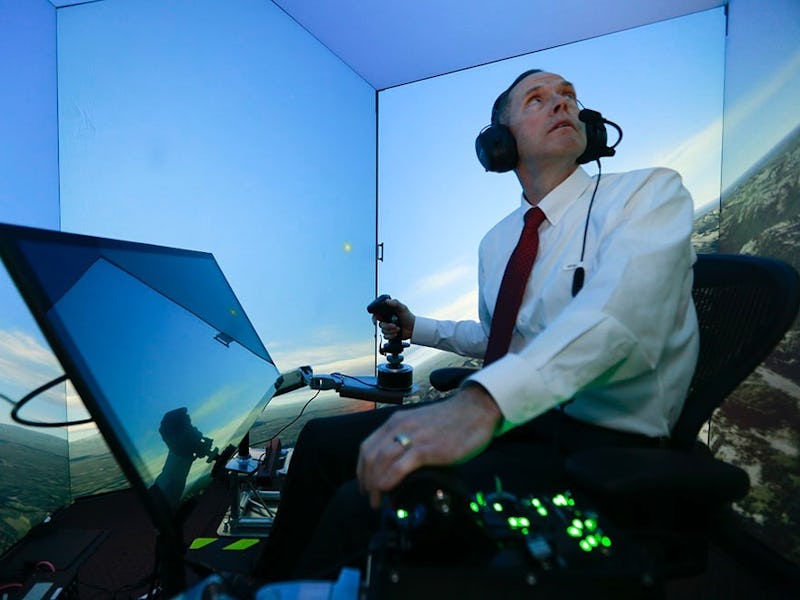New Drone A.I. Wins Dogfights With Fighter Pilots Like It's NBD
The battle for air supremacy isn't about who's got the stick anymore.

When artificial intelligence systems started beating humans at things, we didn’t think too much of it. Sure, it makes sense that a computer would be able to crunch the probabilities for a highly mathematical game like chess and store enough information to win at Jeopardy!. But when Google’s AlphaGo A.I. beat human world champion Lee Se-Dol at Go, the ancient Chinese game of creativity and strategy, we started to get a little worried. Now, the University of Cincinnati says their ALPHA system, an A.I. fighter pilot, is consistently beating one of the best fighter pilots on the planet in simulated rounds of air combat.
Flight simulators and air combat games have long tried to present gamers with realistic A.I. opponents, but they’ve rarely held up in hyper-realistic simulations of the real thing. But the new A.I. designed by Psibernetix, Inc., a recently founded company run by a group of University of Cincinnati College of Engineering and Applied Science alumni and faculty, has been able to shoot down one of the Air Force’s top guns repeatedly in simulated combat.
ALPHA has been facing off against retired United States Air Force Colonel Gene Lee, an aerial combat instructor and Air Battle Manager. Colonel Lee, who literally went to Top Gun (or the Air Force’s version, the Fighter Weapons School), spent his entire career in the armed forces focusing on flying and commanding American fighter jets. He is an ace and he’s getting his ass handed to him.
Colonel Lee behind the controls of his simulated fighter.
According to the University’s magazine, it’s not even close. Lee faced off against ALPHA multiple times last October and was unable to score a single kill against ALPHA, which shot him out of the air during every simulated mission. The university reports that ALPHA has bested other experts as well, even when given deliberate handicaps. The researchers sent a highly-trained ace fighter pilot against a computer, crippled the computer’s virtual plane (handicapping its turning, speed, missiles, and sensors), and the computer still took down the humans.
“I was surprised at how aware and reactive it was,” Col. Lee told the UC Magazine. “It seemed to be aware of my intentions and reacting instantly to my changes in flight and my missile deployment. It knew how to defeat the shot I was taking. It moved instantly between defensive and offensive actions as needed.”
Colonel Lee went on to describe the experience as fundamentally different than flying in other simulators against different A.I.s. “Until now, an A.I. opponent simply could not keep up with anything like the real pressure and pace of combat-like scenarios,” he said.
In other words, this is not a drill. We all thought 2005’s Stealth was a silly, unrealistic action movie that was a waste of Jessica Biel and Jaime Foxx’s talents, but it wasn’t. It was apparently a prediction about a future in which our aircraft can out-maneuver our best pilots with ease.
All that said, the fighter-A.I. isn’t likely to go rogue and start bulls-eyeing human pilots any time soon. For one thing, it still exists exclusively in the simulation environment. But DARPA’s integration of A.I. into drone behavior means that ALPHA’s potential as an autonomous wingman is very real. The A.I.’s reaction time is exponentially faster than a human’s, and it’s capable of coordinating tactical plans and responses to stimuli, even in the 1500-miles per hour world of air combat. The whole thing runs off of a computer no better than a budget laptop.
The secret, Psibernetix President and CEO Nick Ernest told the UC Magazine, is something called “Genetic Fuzzy Tree” computing. Essentially, the strangely-named GFT system takes calculations that would have previously needed a supercomputer and breaks them down into smaller “sub decisions,” that require crunching fewer variables.
“The easiest way I can describe the Genetic Fuzzy Tree system is that it’s more like how humans approach problems,” Ernest says. Instead of crunching every tiny variable like a supercomputer, the GFT system decides to look at the most relevant problem at hand and just crunch for that, tossing the other variables out in order to make faster decisions in a changing environment.
From left: Col. Lee, Ernest, and UC's Kelly Cohen in the flight simulator.
UC aerospace professor Kelly Cohen says that the ALPHA system, as it continues to learn and adapt to future versions, will become the dogfighting equivalent of AlphaGo or another better-than-human supercomputer.
“In terms of emulating human reasoning, I feel this is to unmanned aerial vehicles what the IBM/Deep Blue vs. Kasparov was to chess,” Cohen said. As it stands, it could be an incredible asset to the military — but if it goes rogue, even Maverick and Kenny Loggins might not be able to save us.